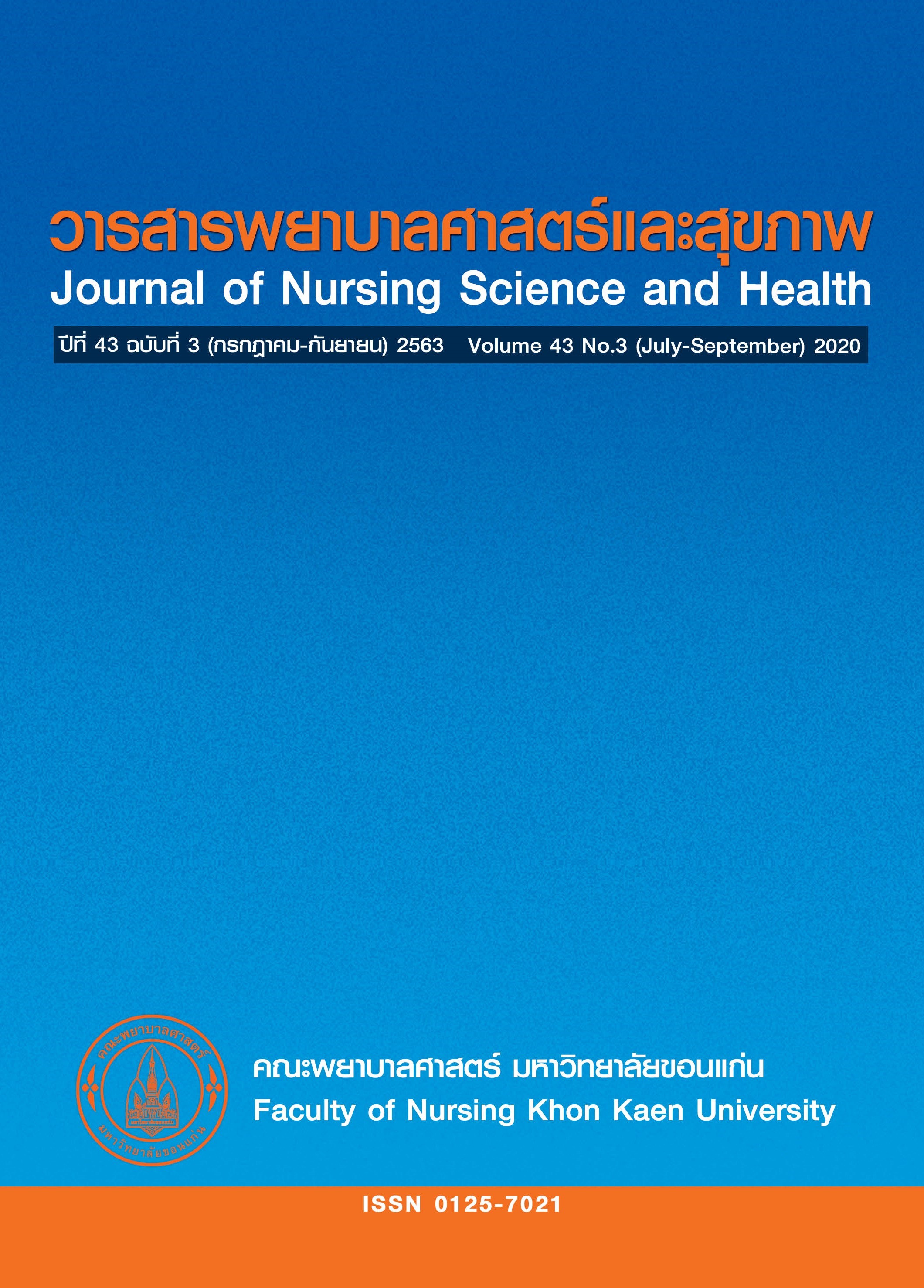การวางแผนการดูแลรักษาล่วงหน้า: ประเด็นสำคัญในการดูแลแบบประคับประคองในผู้สูงอายุ
คำสำคัญ:
การวางแผนการดูแลรักษาล่วงหน้า การดูแลแบบประคับประคอง ผู้สูงอายุบทคัดย่อ
บทความวิชาการนี้ นำเสนอประเด็นที่เกี่ยวข้องกับการวางแผนการดูแลรักษาล่วงหน้าในกลุ่มผู้สูงอายุ ประกอบด้วยประเด็นสำคัญ จำนวน 2 ประเด็น ได้แก่ 1) ปัจจัยที่เกี่ยวข้องกับการวางแผนการดูแลรักษาล่วงหน้าสำหรับผู้สูงอายุ ประกอบด้วยอุปสรรคด้านตัวผู้สูงอายุ และ ด้านครอบครัวหรือผู้ดูแล และปัจจัยอื่น ๆ และ 2) แนวทางในการส่งเสริมการวางแผนการดูแลรักษาล่วงหน้าของผู้สูงอายุ ในฐานะบุคลากรทางการแพทย์ควรมีการเตรียมการเพื่อส่งเสริมให้เกิดการวางแผนการดูแลรักษาล่วงหน้าสำหรับผู้สูงอายุ การเตรียมการที่ดีจะทำให้ผู้สูงอายุตระหนักและยอมรับการวางแผนการดูแลรักษาล่วงหน้า ตลอดจนมั่นใจที่จะได้รับการดูแลแบบประคับประคองเพื่อให้มีคุณภาพชีวิตที่ดีในระยะท้ายของชีวิต
เอกสารอ้างอิง
National Elderly Committee. The 2nd national plan on the elderly 2002-2021. 1st revision; 2009. (in Thai)
Ubolwan K, Poungkaew A, Sanghuachang W, Khunpinit K. Factors predicting the happiness of community-dwelling older adults with chronic diseases. J Public Health 2018; 48(2):244-55. (in Thai)
Voumard R, Rubli Truchard E, Benaroyo L, Borasio GD, Büla C, Jox RJ, et al. Geriatric palliative care: A view of its concept, challenges and strategies. BMC geriatrics 2018; 18(220):1-6.
Boonchalermvipas S. Section 12 of national health act, B.E. 2550. Bangkok: 3 D printing equibment; 2016. (in Thai)
Phungrassami T. Advance care plan [cited 2019 Jul 25]. Available from: https://www.gotoknow.org/posts/472858. (in Thai)
Fan SY, Sung HC, Wang SC. The experience of advance care planning discussion among older residents in a long-term care institution: A qualitative study. J Clin Nurs. 2019 Oct;28(19-20): 3451-8. doi: 10.1111/jocn.14936. Epub 2019 Jun 21.
Putika Foundation. [Internet]. Advance care plan [cited 2019 Jul 28]. Available from: http://boonbudnet.com/sunset/node/213. (in Thai)
National Health Commission office. Living will [Internet]. 2019 [cited 2019 Jul 25]. Available from: http://www.thailivingwill.in.th/content living will. (in Thai)
Pimsen A, Wirojratana V, Jitramontree N. Community-dwelling older adult’s attitudes, subjective norm, perceived behavioral control, and intention to make living wills. JTNMC 2019; 34(1): 74-87. (in Thai)
Petkong D. [Internet]. Living will. [Updated 2019 Nov 4; cited 2020 Apr 14]. Available from: https://www.parliament. go.th/ewtadmin/ewt/elaw_parcy/ewt_dl_link.php?nid=1786. (in Thai)
Kunakornwong W. [Internet]. Preparation before the end of life: Choose to stay or go with hope [Updated 2019 April 11; cited 2019 Jul 11]. Available from: https://tdri.or.th/2019/04/attitude-toward-palliative-carein-thailand/. (in Thai)
Thaniwattananon P, Isaramalai S, Naka K, Supansathit J. Living will and health of elders with chronic illness at the end of life as perceived by caregivers. Journal of Nursing Science and Health 2016; 39(2): 118-32. (in Thai)
Wongprasertsuk C, Pramaunwongteera T. Attitudes toward writing self-advance directives. JMedHealthSci2018;25(3):81-94.(in Thai)
Saracino RM, Bai M, Blatt L, Solomon L, McCorkle R. Geriatric palliative care: Meeting the needs of a growing population. Geriatr Nurs 2018; 39(2): 225-9.
Mueller PS, Hook CC, Fleming KC. Ethical issues in geriatrics: a guide for clinicians. Mayo Clin Proc 2004; 79(4): 544-62.
Kunsongkeit W. Good death as perceived by the patients.The Journal of Faculty of Nursing Burapha University 2013; 21(4): 25-36. (in Thai)
PiriyapunP, KlinwichitW, InchaiP, Somanusorn S. Theelderlyandfamily‘sparadigmfor preparing the end-of-life on hospital based care. Journal of Nursing and Education 2017; 10(2): 1-18. (in Thai)
Junsomkoy C, Wirojratana V, Chanruangvanich W. Relationships between basic condition factors, symptom severity, Palliative self-care behaviors and quality of life in older adults with advanced cancer receiving chemotherapy. Journal of The Royal Thai Army Nurses 2018;19 suppl: 108-17. (in Thai)
Nakasenee S. Self healthcare behavior of the elderly in Bangkok. Rajaphat Rambhai Barni Research Journal 2018; 12(1): 39-48. (in Thai)
Kunsongkeit W. Good death as perceived by the patients. The Journal of Faculty of Nursing Burapha University 2011; 19 Suppl 2: 138-45. (in Thai)
Tangtanawutwet T. Buddhist ethics and the extending of death at the end of life with the intention of denying. Bulletin of Suanprong 2017; 33(1): 47-64. (in Thai)
Boonchalermvipas S. End of patients’ life: a medicalfact with legal limits. Public Health & Health Laws Journal 2015; 1(3): 241-53. (in Thai)
Tipkanjanaraykha K, Saleekul S, Apisitwasana N, Thiammok M. Advanced care planning for peaceful death. JBCNM 2017; 33(3): 138-45. (in Thai)
Rajawang N. Declaration of intention to refuse life sustaining of terminal stage patient: perspective of elderly in Bangkok Metropolitan. Thailand Journal of Health Promotion and Environment 2013; 36(4): 54-65. (in Thai)
Owen L, Steel A. Advance care planning: what do patients want?. Br J Hosp Med (Lond) 2019; 80(5): 263-7.
Puangniyom S, Rungnoei N, Boontae U. Development of integrated healthcare model for the dependentelderlyinthepilotareas.Phetchaburi province 2019; 38(3): 178-95. (in Thai)
Boonchalermvipas S, Pirojkul S, Watanapa P, Ruyaporn T, Limwongse C, Wansawang P, editors. Withholding and withdrawing of life-sustaining treatment. Bangkok: Pimsiripatana; 2019. (in Thai)
Chai E, Meier D, Morris J, Goldhirsh S. Geriatric palliative care: A practical guide for clinicians. New York: Oxford university press; 2014.
Wuthiphongpat P. Palliative care according to the religious beliefs and the living will. Veridian E-Journal, Science and Technology Silpakorn University 2016; 3(6): 149-61. (in Thai)
ดาวน์โหลด
เผยแพร่แล้ว
รูปแบบการอ้างอิง
ฉบับ
ประเภทบทความ
สัญญาอนุญาต
วารสารพยาบาลศาสตร์และสุขภาพเป็นเจ้าของลิขสิทธิ์ในการเผยแพร่ผลงานที่ตีพิมพ์ห้ามผู้ใดนำบทความที่ได้รับการตีพิมพ์ในวารสารพยาบาลศาสตร์และสุขภาพไปเผยแพร่ในลักษณะต่าง ๆ ดังนี้ การนำบทความไปเผยแพร่ออนไลน์ การถ่ายเอกสารบทความเพื่อกิจกรรมที่ไม่ใช่การเรียนการสอน การส่งบทความไปตีพิมพ์เผยแพร่ที่อื่น ยกเว้นเสียแต่ได้รับอนุญาตจากวารสารพยาบาลศาสตร์และสุขภาพ



